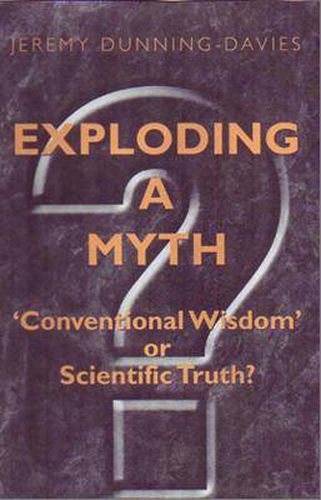Readings Newsletter
Become a Readings Member to make your shopping experience even easier.
Sign in or sign up for free!
You’re not far away from qualifying for FREE standard shipping within Australia
You’ve qualified for FREE standard shipping within Australia
The cart is loading…






In this book Jeremy Dunning-Davies deals with the influence that conventional wisdom has on science, scientific research and development. He sets out to ‘explode’ the mythical conception that all scientific topics are open for free discussion and argues that no-one can openly raise questions about relativity, dispute the ‘Big Bang’ theory, or the existence of black holes, which all seem to be accepted facts of science rather than science fiction.
In today’s modern climate with Britain’s radioactive refuse heap already big enough to fill the Royal Albert Hall (Edmund Conway, Economics Editor The Daily Telegraph 28.11.06), it is alarming that there are potential advances in hadronic mechanics which could conceivably pave the way for new clean energies and even a safe in-house method for the disposal of nuclear waste, that have not even been considered by the present establishment. These examples are from the field of physics but there can be little doubt that outside factors have affected the progress of most, if not all, branches of science for many years. Factors other than purely scientific ones still appear to be exerting tremendous influences on progress in a wide variety of fields. Is it too idealistic or naive to expect that science should remain pure and stay unaffected by such factors? Dr Dunning-Davies presents a beautifully written argument that if science is to progress, and be of any real use, these external factors must be held at bay.
$9.00 standard shipping within Australia
FREE standard shipping within Australia for orders over $100.00
Express & International shipping calculated at checkout
In this book Jeremy Dunning-Davies deals with the influence that conventional wisdom has on science, scientific research and development. He sets out to ‘explode’ the mythical conception that all scientific topics are open for free discussion and argues that no-one can openly raise questions about relativity, dispute the ‘Big Bang’ theory, or the existence of black holes, which all seem to be accepted facts of science rather than science fiction.
In today’s modern climate with Britain’s radioactive refuse heap already big enough to fill the Royal Albert Hall (Edmund Conway, Economics Editor The Daily Telegraph 28.11.06), it is alarming that there are potential advances in hadronic mechanics which could conceivably pave the way for new clean energies and even a safe in-house method for the disposal of nuclear waste, that have not even been considered by the present establishment. These examples are from the field of physics but there can be little doubt that outside factors have affected the progress of most, if not all, branches of science for many years. Factors other than purely scientific ones still appear to be exerting tremendous influences on progress in a wide variety of fields. Is it too idealistic or naive to expect that science should remain pure and stay unaffected by such factors? Dr Dunning-Davies presents a beautifully written argument that if science is to progress, and be of any real use, these external factors must be held at bay.